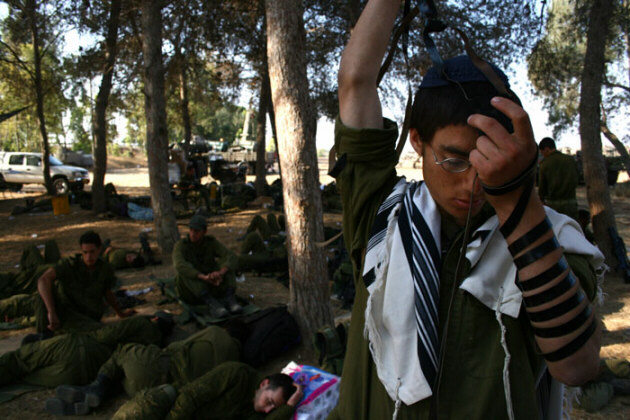|
Postcards from Gaza 
For me, the most difficult aspect of this conflict is the role played by religion. Most religious Israelis are against the disengagement -- not only including but especially including the sort of hippie-ish, Carlebach-loving crowd whose company I usually enjoy. A huge percentage of the most ardent right-wing radicals are pot-smoking kids (or former pot-smoking kids) who sing songs about peace and love. How is this possible? How can you "love peace" but want to maintain a bloody occupation in land that is of no religious or political significance to Israel and the Jews? It's complicated. Many of these people see the Palestinian Arabs as intractable enemies of the Jews. Some are Biblically-inspired. But others are more pragmatic, and look only to the betrayal of Oslo. We tried trusting them, some say, and their leader secretly tried to kill us. You don't understand. You're not here. You don't see them every day. Much of the Left's discourse, meanwhile, is authentically anti-religious, and contains within it a great naivete about how much many Palestinian Arabs really do hate Israelis. Really, though, why shouldn't they? If the Left's narrative of events is correct, these are people whose homes and land were stolen, and who are subject to daily harassment and humiliation. Wouldn't you hate your oppressor? This is the argument Zeev Jabotinsky, forerunner of today's Israeli Right, made decades ago. He argued: I'm not the racist here. I respect the dignity of the Arabs -- which is why I think they will never make peace with us.
The feeling, which turns into an ideology, is: the more intensely you love Israel and Jewishness, the more you want to hold onto it. And so, the more you loathe those who threaten it. These are not people who see Judaism as a finger pointing at the Moon. For them, it's the finger, the moon, and the only way to spot it. And again the Left misunderstands. They see it only as fanaticism, as if people are worked up in a frenzy over nothing. That's not right. There is real fire that the Jewish path touches -- real energy, real holiness. It's just that other paths touch it as well -- even ones which may seem to threaten our own. This isn't to advise "national suicide" or deny the presence of intractable enemies of Israel. But there are many reasonable Palestinians already -- and the way to make more of them is surely not to make matters more cruel, more oppressive than they absolutely need to be.
I honor the peacemakers who gather together in reconciliation, and who build bridges between communities. But my hope does not lie with them. I still have hope, because flowers bloom on my porch in West Jerusalem, and someone is baking a pie, and when the sirens and chatter and agitated slogans finally abate, inside and outside, there is the beautiful redemption of the ordinary. Peace will come from this seeming inversion of priorities -- away from that which is held sacred, away from ecstasy and ideology, and toward that which is actually sacred: that which is not held, and which is the simple, the everyday, and the plain. As always, peace will come if the conditions of oppression are lifted, and people are able to be boring.
|
 Freedom and the Ordinary
Freedom and the Ordinary
April, 2004
A conversation with two campus activists
July, 2005
May, 2005
Artists on 9/11 and the war on/of terror
October, 2004
October, 2004
Catching up with some famous refugees
May, 2004
On the Mel Gibson film and the passions of religion
March, 2004
Lost in Translation: A snapshot of the evansescent
October, 2003
The weird and worrying links between the radical Left and the Islamist Right
April, 2003
The ambiguities of art and life
March, 2003
Avoiding the obvious Jewish responses to the mideast crisis: a response
to Jay Michaelson
June, 2002
It's a lonely world when you're both an anti-globalization leftist and a
Zionist.
May, 2002



Tisha B'Av
David Harris Ebenbach
Postcards from Gaza
Photographs by
Kitra Cahana
Morituri Te Salutant
Ari Belenkiy
The Place of Anger
Fiction by Jay Michaelson
Much Ado on 2nd Avenue
Leah Koenig
Elinor Carucci: Diary of a Dancer
Commentary by Eliot Markell
Archive
Our 730 Back Pages
Zeek in Print
Summer 2005 issue now on sale
About Zeek
Mailing List
Contact Us
Subscribe
Tech Support
Links
Limited Time Offer
Subscribe now and get
two years of Zeek for
25% off regular price.
Click this button
to purchase:


 Email us your comments
Email us your comments